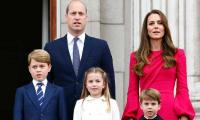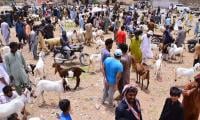ISLAMABAD: Prime Minister Imran Khan Thursday said loans are piling up and further loans are being taken to repay the previous loans.
“The loan instalments we have to pay increase every year. We have unfortunately been unable to properly manage our economy. We have taken several loans, which instead of creating wealth to help pay back loans are actually increasing our loans," he said at the ground-breaking ceremony of Farash Town apartments in Islamabad, which is a housing project under the Naya Pakistan Housing programme.
The prime minister said the PTI government returned Rs15,000 billion more in the head of loans as compared to the previous PML-N government. He said the fate of the country would have changed if this amount was spent on infrastructure development.
The premier said banks in Pakistan are not in the habit of giving loans to people without influence. "People still face obstacles when they approach banks for small loans to make a house," the premier told the audience, explaining that negotiations between the government and banks are still under way.
He spoke about going towards automation to make processes, such as going to the Capital Development Authority (CDA) to get permission for construction or house maps approved, easier.
Imran Khan appreciated military engineering group Frontier Works Organisation's (FWO) work on the housing project, mentioning FWO's contribution in completing infrastructure work at Kartarpur Corridor in "record time".
The prime minister said katchi abadis (slums) are increasing across Pakistan because people don't have enough money to make houses. "Nobody has ever thought of the people living in slums," he said, adding that around 40 percent of Karachi is a slum area.
In Islamabad, too, slums are spreading. As part of this apartment project, the premier said 600 people living in slums will be given flats. He hoped for everyone living in slums to one day own a house of their own. He said the government will fulfil promise of providing houses to people.
He said the Naya Pakistan Housing project is linked to 30 other industries and so it will help create wealth in the long run. “Housing will generate economic activity in Pakistan and eventually also increase tax collection and wealth creation,” he said, explaining that all these factors will help ease the burden of loans on Pakistan.
Meanwhile, addressing the 10th virtual summit of the D-8 Organisation for Economic Cooperation, Imran Khan called upon member countries of the Developing Eight (D-8) to expand the scope of mutual trade and mobilise resources to tackle the challenge of the COVID-19 pandemic and called for investing in youth.
The theme of the summit, hosted by Bangladesh, was “Partnership for a Transformative World: Harnessing Power of Youth and Technology”. The premier emphasised that the contemporary global challenges of a changing world are a moving target: No single country could address these complexities in isolation.
“I am happy that, in D-8, we have a platform to work together for mutual benefit and win-win solutions,” he said. Imran Khan said D-8 had been formed to improve member states’ position in the global economy, diversify and create new opportunities in trade relations, enhance participation and decision-making at the international level, and improve living standards.
He noted that today, D-8 was a grouping of over one billion people with a combined GDP of $4 trillion and “we possess two essential prerequisites for growth: resources and enterprising people”.
He proposed a five-pronged roadmap to realise the vision of D-8 in these testing times. “We must mobilise financing and resources to recover robustly from the economic and health crisis induced by the COVID pandemic,” Imran Khan said.
He recalled to have had already proposed a five-point plan, which included debt relief, creation and redistribution of special drawing rights, mobilisation of climate finance, elimination of illicit financial flows and return of stolen assets to developing countries.
Expansion of intra D-8 trade: The prime minister suggested that ‘concrete actions should be taken to expand trade between the D-8 countries from the current $100 billion to $500billion by 2030 and it should include measures like simplification of border procedures, enhancing institutional linkages and operationalising new initiatives.
Imran Khan said a strategy to engage the youth of the developing countries through promoting cultural, educational, scientific and business exchanges was very important. He particularly emphasised forming linkages through educational institutions such as scholarships, skill development programmes, trainings, fellowships, joint research, and exchange programmes for the youth, especially in the field of science and technology.
He said technological development is a gateway to economic prosperity particularly in the post-pandemic period when reliance on technology would be greater than ever before in human history.
“To remain competitive, we must promote knowledge-based economies, increase expenditure on research and development, and focus on rapid digitalisation,” he said. Relevance of the D-8 in citizens' lives: Imran Khan stressed that it was important to make the D-8 organisation relevant in the lives of the citizens of its members.
“This could be achieved through promoting food security, enhancing cooperation in health, holding joint sports events and helping during natural disasters,” he said. Imran Khan said the health crisis had accentuated inequalities not only within countries but also between rich and poor countries.
“The COVID-19 pandemic has caused the death of over 2.9 million people, more than 250 million people have become unemployed, trillions of dollars were lost as a result of global economic contraction and the virus has taken a heavy toll on poor countries and the poor in all the countries," he said.
He noted that the developing countries were faced with the dual dilemma of saving their people from the virus as well as hunger. “Today, the world boasts a large number of young people, who are unemployed, uneducated and unskilled for the demands of the 21st century,” he added.
“Harnessing technology, promoting innovation, and investing in youth education, skills and training is, therefore, an urgent imperative,” he said, and continued that his government was tackling this investment in the youth through initiatives such as the Kamyab Jawan and Hunarmand Pakistan programmes, Youth Entrepreneurship Scheme and Digital Pakistan.
Imran Khan contended that Covid-19 vaccines should be treated as a global public good to ensure equity, affordability, enhanced production, and timely supply to save lives. Elaborating, he said that technological changes were bringing transportation and communication costs down, while automation was replacing labour.
“D-8 countries should keep up with changing logistics and supply chains while protecting their labour-intensive economies from unemployment and social disruption,” he said. Meanwhile, the prime minister discussed economic situation with Minister for Finance Hammad Azhar and SBP Governor Reza Baqir
The SBP governor informed the prime minister that the remittances from Roshan Digital Account have crossed $800 million, which was a welcome development. Separately, Minister for Housing Tariq Bashir Cheema called on Imran Khan and both had discussion on political situation in the country. Moreover, Tariq Bashir Cheema briefed the prime minister on the progress of the ongoing projects of the Ministry of Housing.
Kasuri urged authorities of Pakistan and China to pull their resources to defeat forces seeking to disrupt the...
IHC said that several people had not returned the cipher copies they had, and asked if it meant it was right for the...
Gilani gave floor to Leader of Opposition Syed Shibli Faraz, who insisted that with unity they could take country...
Match witnessed intense action and dramatic twists, keeping fans on the edge of their seats until the final ball
Apex court bench was reconstituted after Justice Yahya Afridi recused himself from hearing the case earlier this month
ECP issued a notification in this connection pursuant to orders passed by LHC







